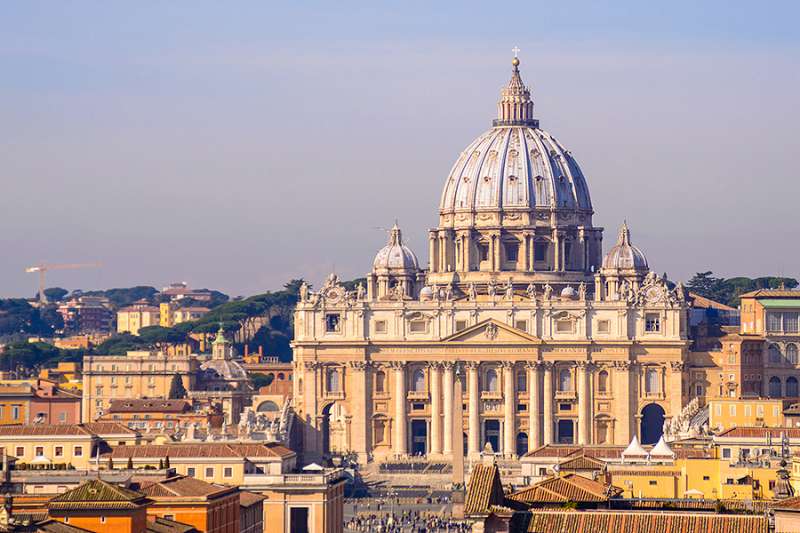A newly released document from the Vatican’s theological advisory commission seeks to explain and advance “synodality,” a concept of particular importance to Pope Francis.
The document “Synodality in Life and Mission of the Church,” approved March 2 by the International Theological Commission aims at “pointing out the theological roots of synodality, and to push for a reform that shapes the Church in view of synodality,” one of the theologians who drafted the document told CNA.
Msgr. Piero Coda, rector of Italy’s Sophia University, was a member of the sub-commission of the International Theological Commission that drafted the document.
Approved by a large majority by the Commission and after that by the pope, the document was published on the International Theological Commission’s website at the beginning of May.
The International Theological Commission is a body linked to the Congregation for the Catholic Education, the Vatican’s “ministry of education,” which oversees curricula and studies at Catholic schools and universities.
The commission is composed of 30 members, and divided into three subcommission of 10 people.
Msgr. Coda told CNA that “the issue of synodality is ancient as the Church is, so much that St. John Chrysostom, one of the fathers of the Church, stressed that “synod” is the name of the Church, that is that the Church is ‘syn-odos’, walking together.”
The concept of synodality is generally understood to represent a process of discernment, with the aid of the Holy Spirit, involving bishops, priests, religious, and lay Catholics, each according to the gifts and charisms of their vocation.
The new document proposes to give new impetus to the concept of synodality through structural reforms, including requiring that every diocese establish a diocesan pastoral council composed of priests, religious, and laity. The document also raises the possibility of establishing new procedures for the convocation of the Synod of Bishops, in order to more frequently involve broader Catholic representation in episcopal deliberations
After the Second Vatican Council, Blessed Pope Paul VI established the Synod of Bishops, and a greater awareness of the concept of synodality made its way in the Catholic Church.
However, “the notion of synodality, though ancient, has had little attention in Western theological Western discourse. Theological discourse has mostly focused on a series of necessary issues, like that of the primacy of the Pontiff,” Coda said
Msgr. Coda said that “synodality was among the three topics proposed for the publication of [a new] document. The set of three topics was: religious freedom in the current international context; the relation between faith and Sacraments, with a special attention to marriage; and synodality.”
Synodality immediately garnered consensus, and the document was quickly drafted.
Regarding the document’s suggestion to modify the processes of the Synod of Bishops, Msgr. Coda said that “there is no practical suggestion, an eventual new procedure must be invented.”
However, he added, “the document raises the issue of a major involvement of the local Churches.”
Msgr. Coda explained that “currently, the Synod of Bishops gathers a representation of Bishops from many different episcopal conferences, but the topics discussed at the synod are not always previously discussed with the local Churches.”
So, the document proposes “that the bishop will be able to hear from the People of God about possible topics of discussion, before synod assemblies.”
According to Msgr. Coda, Pope Francis already adopted a new kind of procedure in that direction when he convoked the pre-Synod of Youth to prepare the 2018 Synod on Youth.
The document also proposes that the establishment of diocesan pastoral councils is made mandatory, which means that the proposed reforms are not only theological, but also structural, explained Msgr. Coda.
“A reform that has no impact on institutions and structures and is merely theological is no more than noise,” the monsignor underscored.
Msgr. Coda noted that “the establishment of presbyterial and pastoral councils was promoted in the Second Vatican Council’s discussion, in order to advance an ecclesiology of communion,” and that this request now needs to be carried forward.
He said that the Diocese of Rome’s 1993 diocesan synod established that in “the Church of Rome, the diocesan councils are not only hoped for, but they are mandatory. I do not now how this has been actually put into effect, but this provision is cited in the Diocesan Synod’s final book.”
The example of the Church of Rome is important because, Msgr. Coda said, “since the beginning, Rome had this central role as the chair of Peter and Paul. It has always been a prototype for all the Churches. Even the College of Cardinals is born out of the synodality lived in the Church of Rome.”
Msgr. Coda said that the theological commission’s document is “not revolutionary, but a normal development” in theological discourse. “A theologically rooted stance on synodality was missing [from the ITC’s work], but there are no ruptures with the past. The document enters the discussion with a certain authoritativeness, and works as a stimulus to propose this reality within the local churches.”
The issue of synodality is crucial for ecumenical dialogue, and not by chance it was discussed recently in the Orthodox -Catholic International Theological Commission, and has been mentioned several recent ecumenical documents.
However, Msgr. Coda added, theological discussion has “helped us to understand that synodality and primacy are interdependent."
"In the Church, an exercise of authority with no interaction makes no sense.” Neither, he said, does theological or pastoral deliberation “without the seal of an apostolic confirmation given by the central authority.”

